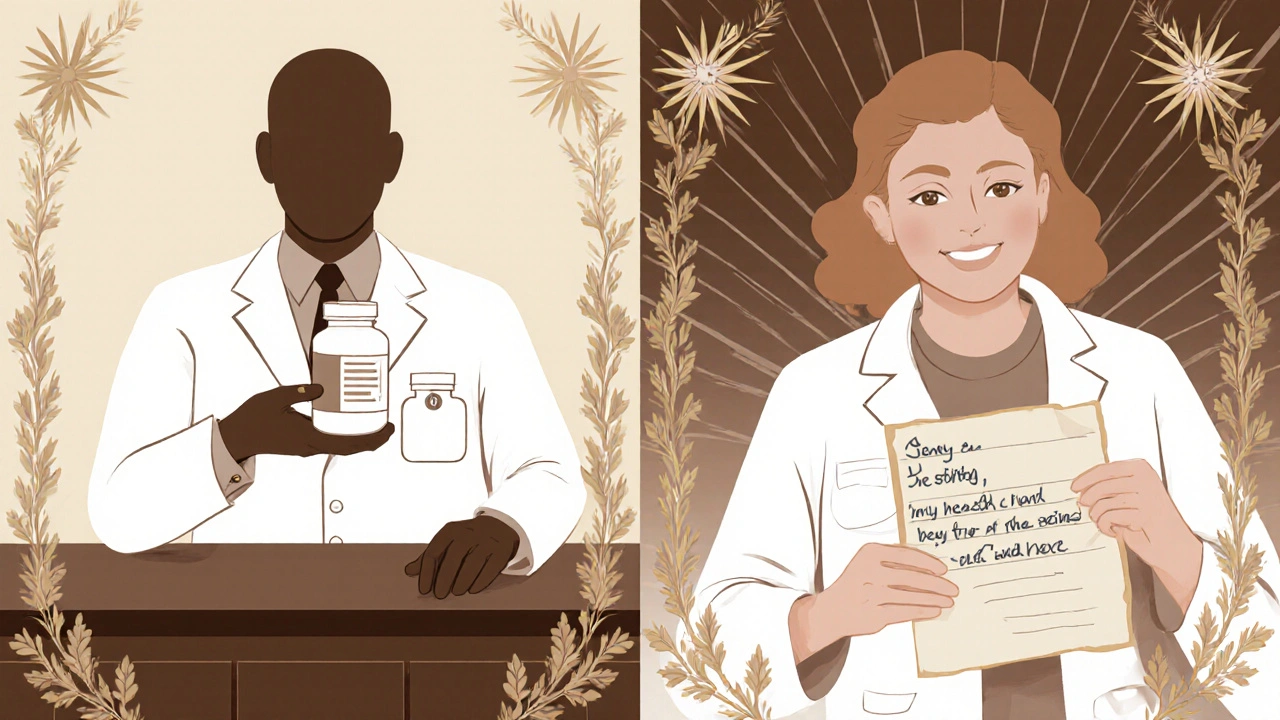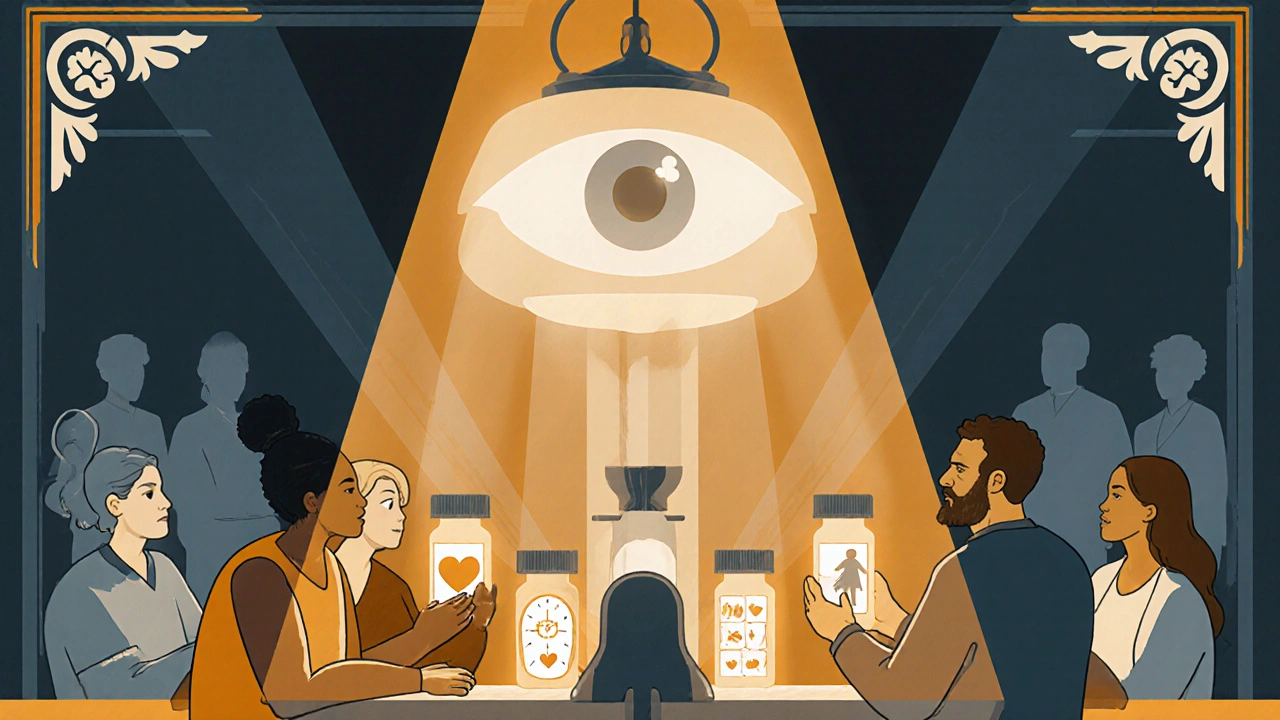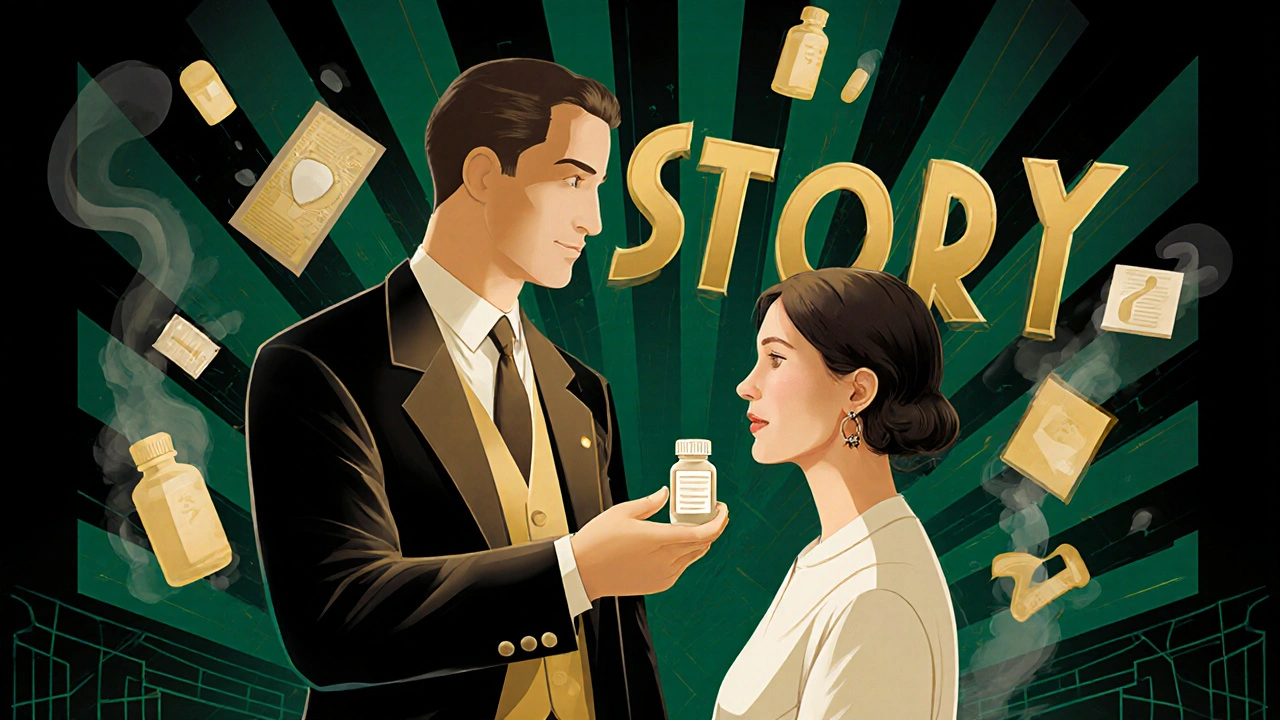When a doctor hands you a prescription for a generic drug, what do you feel? Relief? Suspicion? Indifference? Most people don’t think twice-until they do. Then they ask: Why is this cheaper version any different? The answer isn’t in the chemical formula. It’s in the story.
Stories Don’t Just Describe Illness-They Shape How We Accept It
In 2001, Dr. Rita Charon, a physician and literary scholar at Columbia University, coined the term narrative medicine an approach to healthcare that uses the power of personal stories to deepen clinical understanding and improve patient outcomes. She noticed something missing in medical training: doctors were taught to diagnose symptoms, not to listen to suffering. Patients weren’t just data points-they were people carrying years of fear, confusion, and loss in their words. Narrative medicine doesn’t treat stories as background noise. It treats them as vital data. A patient saying, “I’ve been taking this pill for six months and it feels like I’m slowly disappearing,” isn’t complaining. They’re revealing how they experience their illness. And that matters-especially when it comes to accepting generic medications. Generic drugs are chemically identical to brand-name versions. But patients often believe they’re inferior. Why? Because the story around them is different. Brand-name drugs come with glossy ads, celebrity endorsements, and decades of marketing that whisper: “This is the real thing.” Generics? They’re sold in plain packaging, often without a name people recognize. No story. No identity. Just a price tag.How Stories Break the Cycle of Distrust
A 2023 study in The Permanente Journal found that when clinicians used narrative techniques-like asking open-ended questions or reflecting back patients’ words-patients were 40% more likely to stick with their prescribed treatment, even if it was generic. Why? Because they felt seen. Imagine a woman with high blood pressure. Her doctor prescribes a generic lisinopril. She’s hesitant. “I used to take the brand name,” she says. “It worked. This one... I don’t know.” A traditional response: “It’s the same active ingredient. No difference.” A narrative response: “Tell me about the brand you used to take. What did it feel like when it worked?” Now the patient isn’t just talking about a pill. She’s talking about stability. About mornings without dizziness. About feeling like herself again. The doctor listens. Then says: “So what you’re really asking is whether this new pill can give you back that feeling.” That moment-when the doctor mirrors the patient’s emotion-isn’t small. It’s transformational. The patient doesn’t just accept the generic. She reclaims ownership of her health story.Doctors Need Stories Too
It’s easy to think narrative medicine is only for patients. But clinicians carry stories too. Pediatric residents, for example, report burnout rates over 50%. Why? Because they’re trained to fix problems, not sit with pain. At Columbia, medical students spend hours reading memoirs, writing reflective journals, and discussing what it means to witness suffering. One student wrote about a child who refused insulin because she believed the shots were “punishment.” The child’s mother had lost her own mother to diabetes and believed the disease was a curse. That story changed how the resident approached treatment. Instead of pushing the insulin, he asked the mother: “What did your mom’s illness mean to you?” That conversation didn’t change the medication. It changed the meaning behind it. The mother began to see insulin not as punishment, but as protection. The child started taking it. Narrative medicine doesn’t replace science. It deepens it. It turns prescriptions into partnerships.
Why Generic Acceptance Isn’t About Price-It’s About Identity
We think people reject generics because they’re cheaper. But that’s not it. People reject them because they feel invisible. A 2022 survey in the UK found that 68% of patients who switched from brand-name to generic medications reported feeling “like they’d been given second-best.” That wasn’t about efficacy. It was about dignity. When a patient hears, “This is just as good,” they hear: “You don’t deserve the real thing.” Narrative medicine flips that script. Instead of saying, “It’s the same,” a clinician might say: “I know this isn’t the brand you trusted. Let’s talk about what you need to feel safe with this one.” That simple shift turns a transaction into a relationship. And relationships build trust. Trust builds adherence. At the University of Kentucky, patients in narrative medicine sessions are asked to write a letter to their future self about their health journey. One man with type 2 diabetes wrote: “I used to think my pills were a punishment. Now I see them as a promise-to myself, to my kids, to the man I want to be.” He started taking his generic metformin without fail.The Tools of Narrative Medicine
You don’t need a PhD to use narrative medicine. You just need to slow down. Here are three simple tools any clinician can use:- Reflective Listening: Repeat back what the patient says in your own words. “So you’re saying this pill makes you feel like you’re losing control?” That alone reduces anxiety.
- Metaphor Exploration: Patients often describe illness in metaphors. “My heart feels like a broken engine.” “My pain is a shadow that follows me.” Ask: “What would that shadow need to leave?”
- Story Sharing: Clinicians who share their own short, relevant stories build connection. “I had a patient once who felt the same way. She thought generics were weak. Then she realized they gave her back her weekends.”

What Happens When We Ignore Stories
Ignore the story, and you lose the patient. A 2021 study in the British Journal of General Practice tracked patients who stopped taking their generic antihypertensives. The most common reason? “I didn’t feel like it was working.” But blood tests showed their numbers were fine. The issue wasn’t pharmacology. It was psychology. They didn’t feel better because no one helped them feel like they were getting better. In contrast, patients who had even one conversation where their story was honored were twice as likely to stay on their medication for over a year.The Bigger Picture: Justice, Equity, and the Power of Voice
Narrative medicine isn’t just about pills. It’s about power. Who gets to tell the story of illness? Usually, the doctor. The patient? They’re expected to be quiet, compliant, grateful. Narrative medicine flips that. It says: Your story matters. Your voice is part of the diagnosis. That’s why it’s gaining traction in marginalized communities. In Bristol, where I live, community health workers now run weekly storytelling circles for patients on long-term medications. People come not to get advice, but to be heard. And when they’re heard, they stay on treatment. This isn’t charity. It’s smart medicine.What Comes Next
The future of healthcare isn’t just AI diagnostics or robotic nurses. It’s human connection. Columbia University now requires all first-year medical students to take narrative medicine seminars. The VA has integrated it into its Whole Health program. Nurses, social workers, and chaplains are trained in it. The message is clear: If you want patients to accept treatment-especially generic treatment-you must first accept their story. The science is solid. The data is clear. The cost? Almost nothing. Just time. And attention. Because sometimes, the most powerful medicine isn’t in the bottle. It’s in the listening.What exactly is narrative medicine?
Narrative medicine is a clinical approach that uses patients’ personal stories to improve understanding, empathy, and treatment outcomes. Developed by Dr. Rita Charon at Columbia University in 1996, it trains healthcare providers to listen deeply, interpret metaphors, and respond to the emotional truths behind illness. It’s not about replacing science-it’s about making science more human.
How does storytelling help patients accept generic drugs?
Generic drugs are chemically identical to brand-name versions, but they lack the marketing stories that build trust. When clinicians take time to understand a patient’s history with their medication-why they trusted the brand, what it meant to them-they can help reframe the generic not as a downgrade, but as a continuation of care. This emotional connection increases adherence by up to 40%.
Can narrative medicine reduce clinician burnout?
Yes. A 2023 study found that over 50% of pediatric residents showed signs of burnout. Those who participated in narrative medicine sessions-like reflective writing or group storytelling-reported higher empathy, self-compassion, and job satisfaction. Listening to patients’ stories helps clinicians process their own emotional weight, reducing isolation and exhaustion.
Do I need special training to use narrative medicine?
No. While formal programs exist (like Columbia’s Master’s degree), you don’t need certification. Simple practices-like asking open-ended questions, reflecting back what patients say, or exploring the metaphors they use-can be learned in minutes. The key is intention: choose to listen more than to fix.
Is narrative medicine just for mental health or chronic illness?
No. It works in every setting: acute care, primary care, pharmacy consultations, even emergency rooms. Whether someone is starting insulin, switching to a generic antibiotic, or recovering from surgery, their story shapes how they accept treatment. Narrative medicine helps bridge the gap between clinical facts and human experience.
Why isn’t narrative medicine used more widely in hospitals?
Many clinicians still see it as “soft” or time-consuming. But research shows it saves time in the long run-patients who feel heard are less likely to return with non-adherence issues or unnecessary tests. The real barrier isn’t evidence-it’s tradition. Hospitals are still structured around speed and efficiency, not connection. That’s slowly changing.
Next time you’re prescribing a generic medication, don’t just hand it over. Ask: “What’s your story with this kind of treatment?” You might be surprised what you hear-and how much it changes everything.


Erika Sta. Maria
November 20, 2025 AT 05:44okay but like… if you think a pill’s gonna work because it has a fancy logo and a jingle, you’re basically trusting a cereal box to cure your diabetes. i mean, come on. the science is the science. the story? that’s just marketing with a stethoscope. 🤡
Nikhil Purohit
November 22, 2025 AT 05:20honestly, this hits different. i had my grandma switch to generic blood pressure meds and she swore they didn’t work-until her nurse sat with her for 20 mins and asked what the old brand meant to her. turns out, it was the only thing that made her feel like she wasn’t ‘giving up.’ we don’t need more drugs-we need more listening.
Debanjan Banerjee
November 23, 2025 AT 09:58There is a fundamental flaw in the premise of this article: narrative medicine is not a clinical intervention, it is a communication framework. The 40% adherence increase cited is not caused by storytelling per se, but by improved patient-clinician rapport, which is a well-documented phenomenon in behavioral psychology. To conflate narrative with efficacy is misleading. The active pharmaceutical ingredient remains the sole determinant of pharmacological outcome. Narrative merely modulates perception, not pharmacokinetics.
Michael Marrale
November 23, 2025 AT 13:59wait… so you’re telling me the government is replacing our brand-name meds with generics… and then telling doctors to ‘listen’ instead of telling us the truth? what if the generics are laced with something? what if the ‘story’ is just a distraction so we don’t ask why our meds are suddenly cheaper? i’ve seen this before… it’s always the same with big pharma and the FDA. they don’t care if you feel better-they care if you shut up.
David vaughan
November 24, 2025 AT 03:55...i just... i had a panic attack last week because my generic Zoloft didn't 'feel' right... and then my therapist said, 'what did the old one do for you?' and i cried for 20 minutes... and then i realized... i wasn't scared of the pill... i was scared of losing the version of myself that took it... this... this is real.
Mark Kahn
November 25, 2025 AT 07:48you’re not wrong. i used to think this was all touchy-feely nonsense… until i saw a veteran with PTSD stop taking his meds because he said the generic made him feel ‘like a charity case.’ we started asking him what he wanted his treatment to say about him. he said: ‘that i’m still fighting.’ so we kept the brand name. for a year. and he got better. sometimes, the medicine isn’t in the bottle-it’s in the dignity.
Daisy L
November 26, 2025 AT 12:09oh please. this is why america is falling apart. we’re turning healthcare into a therapy session. next they’ll want us to write poetry before getting a flu shot. we don’t need ‘stories’-we need science. we need efficiency. we need pills that WORK, not emotional pep talks from a doctor who’s too lazy to prescribe the right dose. this is socialism disguised as empathy.
Eliza Oakes
November 28, 2025 AT 05:32okay but imagine this: you’re a 72-year-old widow who’s been on the same brand of cholesterol pill for 18 years. you named it ‘Bob.’ you say good morning to Bob every day. you cry when he’s gone. and now some bureaucrat says, ‘Bob’s dead. Here’s Gary. Same thing.’ you don’t care if Gary’s chemically identical-you care that Bob’s gone. this isn’t about efficacy. it’s about grief. and no one wants to talk about that. so they call it ‘non-adherence.’
Shawn Sakura
November 28, 2025 AT 15:10just... just wanted to say thank you. i’m a nurse. i’ve been doing this for 15 years. i used to rush through visits. i thought i was being efficient. then i started asking ‘what does this mean to you?’ and... wow. i didn’t realize how much i was missing. i cried on my lunch break yesterday. not because i was tired. because a patient told me she felt like a person again. thank you for reminding me why i started.
Swati Jain
November 29, 2025 AT 13:54let’s be real: narrative medicine is just ‘emotional labor’ repackaged as clinical innovation. we’re asking nurses to be therapists, doctors to be poets, and pharmacists to be life coaches. meanwhile, the system is still underfunded, understaffed, and overworked. if you want adherence, fix the wait times, the copays, and the supply chain. not the damn metaphors. we’re not in a TED Talk, we’re in a triage room.
Florian Moser
November 30, 2025 AT 00:09the most powerful part of this isn’t the stats-it’s the letter to the future self. that’s not therapy. that’s reclamation. when someone writes, ‘I’m not a diabetic. I’m a father who takes metformin to be there for his kids,’ that’s not compliance. that’s identity. and identity is the only thing that lasts longer than a prescription.
jim cerqua
November 30, 2025 AT 09:10you know what’s really scary? They’re not just replacing pills. They’re replacing the narrative of American medicine. Once upon a time, doctors were gods. Now they’re storytellers. And the patients? They’re the ones holding the pen. That’s not progress. That’s a revolution. And revolutions don’t end with a handshake. They end with a bloodstain on the white coat. And guess what? The FDA’s already drafting the bill to ban reflective listening. They call it ‘emotional obstruction.’